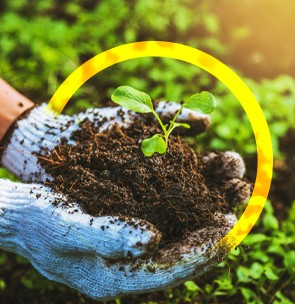

Published on Apr 11th, 2023

The organic world covers all living creatures, and how they interact with one another and their surroundings is vital for ensuring global sustainability. Organic farming involves growing food without synthetic chemicals or genetically engineered ingredients, only organic ingredients.
Organic farming is typically seen as a far more sustainable option when it comes to producing food. Although organic farming offers numerous benefits, it does not eliminate the environmental issues connected to food production. It should come as no surprise that the argument between conventional and organic farming is exceptionally controversial in intellectual circles.
This blog will address how the organic world contributes to sustainable development and why it should be captured and protected.

The organic world offers ecosystem services that are essential to human well-being. Ecosystem services are provided by a biological community of interacting species and their physical surroundings.
These services include pollination, nutrient cycling, soil building, and air and water cleaning. Our communities would struggle to function without these services, and our economies couldn't support themselves.
For example, pollinators reproduce many agricultural products worldwide, including bees, butterflies, and birds. Without them, crop yields would significantly decrease, resulting in food shortages and increased consumer costs. Our Organic syrup maintains the environment.

The organic world is essential for maintaining Earth's climate and reducing the consequences of global warming.

Biodiversity, or the variety of life on Earth, is a product of the organic world. Many advantages of biodiversity include increased environmental resilience, cultural significance, and business opportunity. Biodiversity-rich ecosystems are better able to withstand disruptions and adjust to shifting environmental factors.
Nevertheless, biodiversity has significant cultural and spiritual significance for many cultures worldwide. Ecotourism, the creation of new pharmaceuticals, and the production of biotechnology products are all examples of how biodiversity offers economic potential.
For instance, indigenous groups frequently have strong cultural ties to nature and rely on its resources for survival.

Nonetheless, despite the worth of the organic world, it is seriously threatened by human activity. These threats include pollution, resource overuse, habitat loss and fragmentation, and climate change. These dangers are leading to a decline in ecosystem services and biodiversity, which has severe consequences for sustainable development.
A comprehensive strategy for safeguarding and handling the organic world is necessary to combat these threats and advance sustainability. In addition to tackling the underlying causes of threats to the organic world, this strategy should focus on protecting biodiversity and ecosystem services.

Preserving and restoring natural habitats is a crucial tactic for advancing sustainability. High-biodiversity areas must be protected, and damaged habitats must be restored to their original state. The long-term sustainability of natural resources, including fisheries and forests, depends on their sustainable management.
Also, it's critical to reduce pollution and waste to stop pollution's damaging effects on the biological world. This entails cutting back on the use of pesticides and other hazardous chemicals in agriculture and greenhouse gas emissions to lessen the impact of climate change.

Integrating traditional knowledge and practices into conservation and management initiatives is another tactic for enhancing sustainability. Including their knowledge and techniques in conservation planning and management include collaborating with indigenous people and regional stakeholders.
The final step in advancing sustainable development is to promote education and awareness. This includes spreading awareness of sustainable practices in all spheres of society and teaching people about the value of the organic world and the dangers it faces.
In summary, the organic world is essential to sustainable development. It contributes significantly to climate regulation, biodiversity, and economic potential while offering critical ecological services. Nonetheless, because of the severe dangers posed by human activity, it must be managed and conserved holistically to preserve its long-term existence.
BackBe the first to know about new products, events and offers.